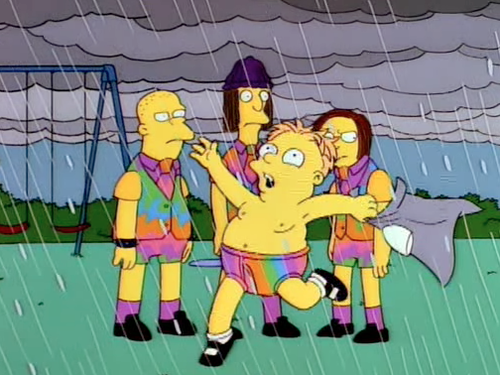If I wanted to type all the opinions and thoughts I was thinking, I would type and type and type until my fingers fell off and my keyboard wore down to blank black buttons. Networked Media is the kind of subject that makes you think and consider. I’m good at that. Maybe too good. Or not good enough.. Anyway.
I’m finding it easier to express myself via pictures I find on the internet. So this is my thoughts about the Network this week.
My first impression of Networked Media:

If you’re not familiar with this episode of The Simpsons, basically Springfield Elementary attempts to create conformist robots out of its students by (shock horror…) GIVING THEM UNIFORMS. In America and this episode, this is seen as a complete restriction of freedom and individuality. Relating to my life, I feel like university is the first time you don’t have to wear uniform (both literally and figuratively); you can do what you like, dye your hair whatever colours, smoke on campus, leave campus for lunch etc. HOWEVER. What is the ‘grey uniform’ of RMIT? The education system itself I guess..
We get told: read this, write this, listen now, do this, turn up at this time, bring this, argue this, hand this in then etc. I’m not particularly complaining, because you do learn a lot this way. However in Networked Media, the rain comes down, and our grey uniforms become rainbow psychedelic and funkadelic get-ups, prompting us to strip naked, run free and do and learn how we like.
That was my first impression anyway. So I feel like Networked Media is allowing me to ‘rainbow’ up the ‘grey uniform’ that the education system can often provide. I am Martin Prince in this example, frolicking fearlessly and prancing in the world of the network after being let off my leash. Yay.
To my next picture… Here is the downside of this feel.

Do I have any grounds to post what I post? What expert am I? Just because I have the technology to be free and post my heart’s desires into the vast chasm of the internet… should I? My opinion is a fancy schmancy self-justified thought process that gets buried under the thousands of others out there on the web. I feel so intelligent and cool and mature typing all these interesting observations about everyday life, but should I? I’m just typing all this down because I have the means to. Internet has given us the extremities of freedom of speech; a downside of this is now everyone’s an expert.
This is how I feel my relationship with the Network is:

I’m sadly in the yellow…. the multi-faceted universe of Media and The Network is sadly in the blue. I love the media industry, I love blogging, I love the Network and I love being able to type this and post it as my own content into the world wide web.
But it doesn’t particularly love me… Just like Bec stated in the unlecture, my opinion is buried underneath the thousands of webcam superstars with 2 million hits around the web.
Adrian’s response to this was that we need to get experience, work hard and be able to produce high quality content in order to be that much better. And succeed. He discussed how the fact that nobody’s watching you dance or paint is absolutely no reason to not do these things. What I took from that is that giving up because people aren’t appreciating your work is so easily. But seriously, shouldn’t it be more about you, improving your skills and doing what you love?
Also… what do you get out of having 6 million views on a Youtube video of you dancing to Lady GaGa’s latest Song?
The people who make these are merely content producers, and content is not king. (thanks Adrian!)
Unless you spend hours working on videos that are cleverly written, created and produced, YouTube views don’t accurately reflect talent and success…. The kids who make videos on Photobooth saying some 5 minute “comedic” rant and receive YouTube fame are essentially mere content producers who can see what people like on the net and mindlessly re-produce it. Like this:

What’s ‘trending’ becomes who you are and what you’re about. That’s not cool. It’s about being talented, working hard, keeping your individualism and not being content producers, but being knowledge creators. Deciding what content producers should produce.
IT ALL MAKES SENSE NOW. TUESDAY’S LECTURE NOW MAKES SENSE TO ME!
THANKS ADRIAN AND INTERNET PICTURES AND MY INCAPABILITY TO STOP TYPING! 675 words later…







